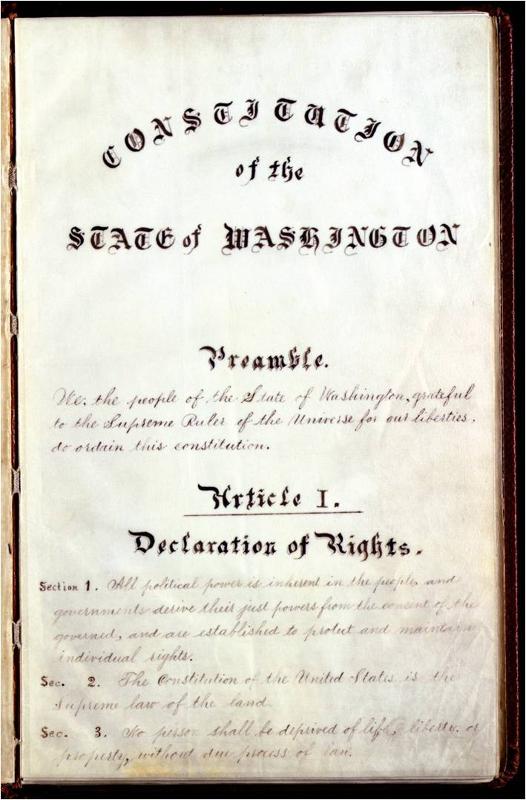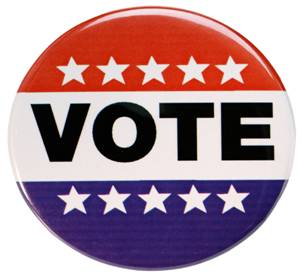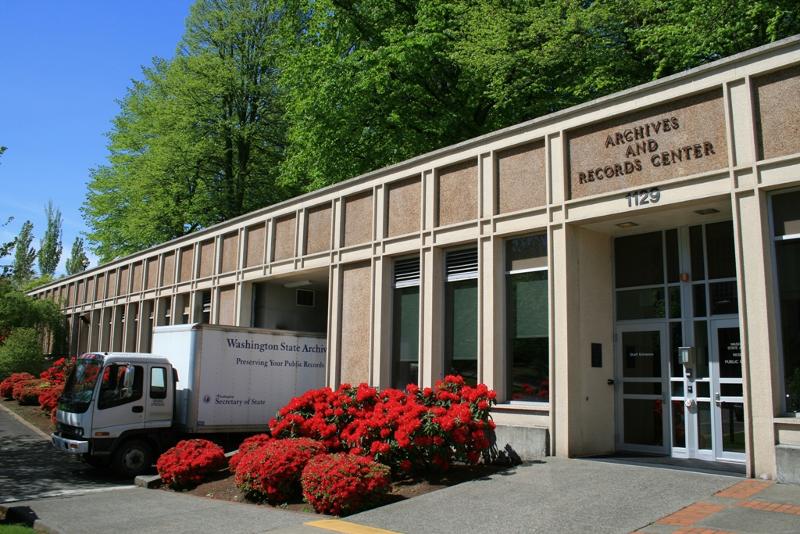
Public Officials and Public Records
Records Management Online: Public Officials and Public Records
PUBLIC OFFICIALS and PUBLIC RECORDS
CONGRATULATIONS!
You are now a part of Washington's history!
Congratulations on your new public office and welcome to the new world of public records!
Whether you are in your second term or brand new as a public official, here are some things to consider regarding public records:
1. Your position and your records are important to our democracy.
2. Your contributions need to be preserved for your grandchildren and future generations.
3. Public records actually promote effective and efficient government.
4. A democracy requires good recordkeeping and access to records for citizens.
5. Public records support accountability, fairness, equity and justice.
Thank you for serving our citizens.
Washington State Archives
1889 State Constitution, Article III, Section 17
"The secretary of state shall keep a record of the official acts of the legislature, and executive department of the state, and shall, when required, lay the same, and all matters relative thereto, before either branch of the legislature....."
Public records document democracy.
"All public records shall be and remain the property of the state of Washington. They shall be delivered by outgoing officials and employees to their successors and shall be preserved, stored, transferred, destroyed or disposed of, and otherwise managed, only in accordance to the provisions of this chapter". Chapter 40.14.020 RCW (1957)
Public records are to be protected and preserved by both state and local governments:
Chapter 40.14.060(1) RCWAny destruction of official public records shall be pursuant to a schedule approved under RCW 40.14.050.
Chapter 40.14.070(2)(a) RCWExcept as otherwise provided by law, no public records shall be destroyed until approved for destruction by the local records committee.
"Made by or received by any agency of the state of Washington in the connection with the transaction of public business and legislative records as described in Chapter 40.14.010 RCW."
Public officials and public records.
From the moment you filed for office and began to campaign, or were appointed to public office, you are now a part of the history of Washington. The records created will be a reflection of your accomplishments.
This online introduction explains:
Sidebars during this session contain additional information and links to other resources.
Elected and appointed public officials represent the citizens:
Citizens have a say in government, and the elected officials they vote into office are a reflection of the times. From the first results to the most hotly contested elections, our state's history is created and shaped whenever there is an election or a new appointment to office.
It is important that public officials understand their role and responsibilities in managing public records, and to maintain and protect the democratic process.
Chapter 42.56.030 RCW (1972)The people of this state do not yield their sovereignty to the agencies that serve them. The people, in delegating authority, do not give their public servants the right to decide what is good for the people to know and what is not good for them to know.
Did you know?
There are requirements to preserve and protect public records.
Effective in 1957, Chapter 40.14 RCW Preservation and Destruction of Public Records outlines the requirements for the retention and disposition of public records.
Chapter 40.14 RCW is the foundation for public records management for the state of Washington.
Although the way we have conducted business since 1957 has changed due to technology, the fundamentals of recordkeeping and the reasons for keeping good records have not changed.
The use of technology has only increased the importance of access and availability.
What is a public record?
Public records are defined by three key criteria in Chapter 40.14.010 RCW
1. "Made by or received by any agency in the State of Washington"
Public records include both records that an agency creates and records that an agency may receive or collect. For example, when an agency solicits public comment on an issue, both the request for comment and any comments received in response are public records.
2. "In connection with the transaction of public business"
A record provides the proof or evidence of agency business. Agency business includes not only the core mission of the agency, but also those functions that support the agency's continuing operation such as finance, human resources, facility and asset management.
If a record meets the two criteria listed above, then it is a public record that needs to be retained and managed.
3. "Regardless of physical form or characteristics"
A public record is a public record, regardless of the format in which it was sent or received. Not only paper records, photographs or microfilm, but records that are created or received using any kind of digital format or application. This includes emails, websites, blogs, wikis, digital photos, text messages, blogs, tweets, and any emerging technologies used to conduct agency business. Having a record in a different format does not change the retention requirements or disposition that is to be applied.
To preserve and protect.
As a public official, you have an responsibiltiy to make sure your agency or entity retains and manages the records of your service and adminstration as well as the agency records.
How many different ways are there to create a record?
Think of all the methods we now use to conduct business. From emails to social media, public officials are using technology in order to communicate and conduct business. What is important is that public officials understand that it's not the medium itself that is the record, it is what is being said and communicated - "regardless of physical form or characteristics."
It's not just paper anymore!
What is Records Management?
Records management is the systematic control and the capturing, classifying and ongoing management of records for their entire lifecycle. 
Records management is:
For government agencies in the state of Washington, records management consists of:
Why manage records?
Records and information are the most important assets of an agency. Simply put, you cannot run a business or agency without records! It is mission critical for an agency to protect and preserve the informational assets of the agency.
1. Enables the agency to fulfill its mission effectively and saves money:
Why manage records?
Public records promote transparency and accountability to the citizens. Knowing what records you have and where they are saves a tremendous amount of time and money in the ability to locate, review, and then produce the requested information in a timely fashion.
2. Promotes open and accountable government
An agency promotes accountability and trust when it demonstrates that their records are:
Being able to readily locate records and information related to any litigation, discovery, and public records requests will reduce risk and costs.
Why manage records?
While it is important to keep your records, it is equally important to practice appropriate disposition actions in a timely fashion.
3. Active retention and disposition reduces volume and overhead costs.
Save on storage costs
Save on IT costs
How do you know what to keep?

What should I be keeping?
A record provides evidence that supports the actions and decisions made during the conduct of government business. Records document this conduct of business, and provide the proof of how and why an official or agency took certain actions and made certain decisions. Only those records that document the conduct of business need to be kept.
All records have a retention value, based on their content and function or purpose. It is important to know what records need to be kept and for how long those records are required to be kept, and what records do not need to be kept and can be disposed of.
About 2% to 5% of records are considered Archival, and those need to be kept forever and are not to be destroyed. Other records have a long term retention of over 10 to 50 years or more, and other records have a fairly short-term retention of less than 10 years. Still other records have little or no retention and can be destroyed when no longer needed.
"Cookies in the break room", potlucks, retirement parties, and other social announcements, a request to carpool to the meeting, Friday funnies, spam or junk mail are examples of records with no retention value.
Some examples of what should be captured and kept as a record are:
 .
.
How do I know what to keep and for how long?
Consult with your records professional in your agency or the approved records retention schedules. Retention schedules provide the means to identify the record, access, store and manage information
Record retention schedules tell you:
Once those records are identified, the retention and disposition stated are applied to those records, and managed accordingly.
For local government agencies, there is a Local Government Common Records Retention Schedule (CORE) and specific sector schedules approved for retention and disposition available online.
For state agencies, use of the State General Schedule and what are called "unique" schedules are to be used for retention and disposition of state agency records. The State General Schedule may be found online, and the "unique" records retention schedules are held by the specific state agencies that developed them for their use.
Public records document democracy.
Congratulations! You have completed our online introduction to "Public Officials and Public Records".
Just like the Founding Fathers, your service and your records will have a role in shaping the history of Washington. Whether you are signing your first policy, introducing a new bill to the Legislature, chairing a committee, or being photographed at the dedication of a new park, these records document your contributions.
Who knows, maybe someday your signature will be just as renowned as John Hancock or Benjamin Franklin!
Our thanks for helping document democracy.
WASHINGTON STATE ARCHIVES - Partners in Preservation and Access
Chapter 40.14.020 (2) RCW"To centralize the archives of the State of Washington, to make them available for reference and scholarship, and to insure their proper preservation.."
At the Washington State Archives, we are home to:
The Washington State Archives is your partner in preservation and access of public records. We have many resources available to assist agencies in the protection of public records. For more information, including transferring Archival records,education and training, records retention schedules, and other tools are available on our website at: www.sos.wa.gov/archives.